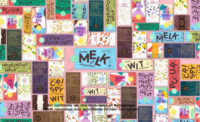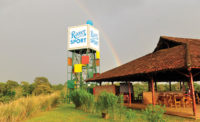Blockchain is a buzzword often tied to cryptocurrencies, but bean-to-bar chocolate companies focused on improving transparency within the cocoa supply chain have other ideas.
They see potential in using the technology — a continuously updated, online ledger that’s verifiable and easy to share — to track cocoa beans by having real-time information available to all links in the supply chain.
And, if opened up, that ledger could be shared with customers concerned about the cocoa’s origin, handling and processing.
Goodio Chocolate, a four-year-old Finnish company, uses an in-house enterprise resource planning (ERP) system to manage operations, including tracking cocoa beans from Peru, Ecuador and the Congo. But, right now, the system doesn’t have a consumer-facing solution that would support the bean-to-bar company in reaching its transparency goals.
Jussi Salonen, Goodio coo and partner, said blockchain came onto the company’s “radar” a few years ago.
“For us the technology used is secondary, but at the moment, it seems that blockchain does offer an interesting solution,” he said. “I would say that the one of the trickiest parts is to communicate in the packaging all this information. In the cocoa sector, transparency would be improved when consumers can see and understand more about farming cocoa.”
Salonen added that Goodio has been exploring possibilities with technology firms in Finland and abroad, hopefully defining specific future steps in the next year. Goodio is also seeking funding to, in part, further its transparency initiatives.
“If the entire supply chain is 100 percent transparent, this could lead into benefits in logistics as well,” he said. “However, in our case it is a bit too early to say what kind of benefits would those be.”
IBM understands how blockchain can alleviate logistical challenges. The IBM Food Trust uses the technology to offer a secure, shareable record of transactions that provides visibility at each step of the supply chain. Digital systems, whether it’s blockchain or another solution, can also free suppliers, manufacturers and retailers from laborious paper record-keeping.
Citing data from Boston Consulting Group, IBM reported that inefficiencies between producers and suppliers are estimated to cost $60 billion annually.
“Inefficiency in the food system is a pervasive problem worldwide,” the company noted. “With so many participants, there are endless opportunities to lose efficiency and profits. Inefficiencies negatively affect consumer pricing, the carbon footprint, food waste and expected freshness.”
There’s also the food safety component. If an issue arises anywhere in the supply chain, with blockchain, it can quickly be followed back to the source, IBM said.
“With a digital food system, network participants have access to tools and data to improve food safety and become a proactive contributor to bettering the food system as a whole,” the company wrote. “Blockchain technology stores digitized records in a decentralized and immutable manner, promoting trust and transparency, which in turn, helps to better the food system and ensure safer food.”
Tony’s Chocolonely, an Amsterdam-based chocolate company, aims to create a shared value chain to make chocolate free of child labor and slavery. While the company uses its Beantracker system to monitor the movement of cocoa from West Africa to Europe, it launched a six-week pilot of a blockchain system with Accenture Technology, another Amsterdam-based firm.
Tony’s Chocolonely enlisted Socoopacdi, an Ivorian cocoa cooperative, and Ocean, a local trader, to test Accenture’s system, which included a web app to enter data, integration services between the app and the blockchain, the multichain blockchain platform and the cloud infrastructure. During the six-week test, Socoopacdi and Ocean would have to record data twice, once in Beantracker and again in the blockchain system.
The first transactions were recorded Jan. 4, 2018, with the pilot wrapping on Feb. 15, 2018. During that period, 900 kilograms of beans were registered through 400 registrations, movements and corrections.
In a Medium post about the pilot, Tony’s Chocolonely said it experienced some technical glitches, but it sees the potential in blockchain for traceability. The company will stay with its Beantracker system for now, but it may incorporate blockchain in the future.
“Tony’s drive is to have all chain partners stay connected and encourage everyone to invest in direct relations which in this case supports data integrity,” the post reads. “Beantracker is designed with the possibility for it to become the industry standard with many other entities joining the platform to monitor and take responsibility for their cocoa value chains, and when more people start to join the movement for slave-free chocolate, and the number of users in the ecosystem grows, blockchain might become increasingly interesting.”
And, in addition to gaining valuable insights, the Tony’s Chocolonely team seemed to enjoy the process.
“In short, the pilot was a great ride, we learned a great deal and had some fun along the way,” the post reads.







